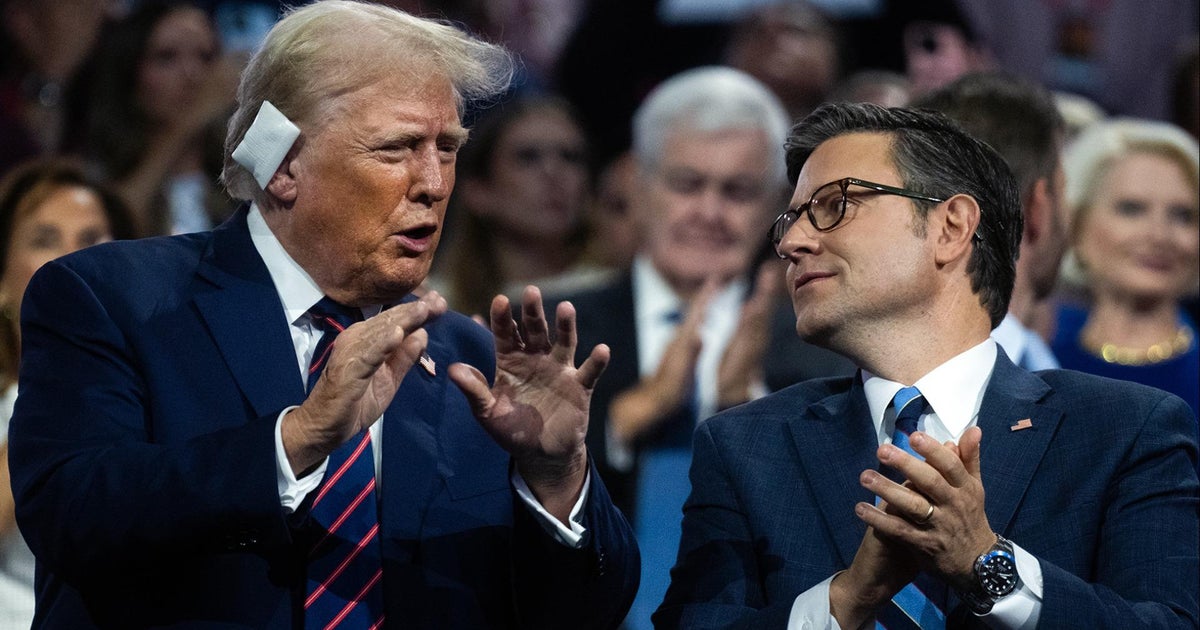CBS News
House conservatives revolt over GOP-backed spending bill to avoid shutdown

Washington — House Speaker Mike Johnson is facing a conservative revolt over a last-minute measure to keep the government funded into the spring and avoid a shutdown, with some Republicans strongly objecting to billions of dollars in spending that has been added to the bill.
Congressional leaders unveiled the stopgap funding measure late Tuesday after days of negotiations, facing a Friday deadline to approve new spending. The bill would extend government funding through March 14, but it also includes disaster aid, health care policy extenders and a pay raise for members of Congress, among other provisions. The disaster relief portion of the bill alone carries a price tag of $110 billion.
The legislation immediately sparked anger from multiple members of the House Republican conference, mostly targeted at Johnson. While the speaker had pledged to avoid the kind of massive, end-of-year spending bills that conservatives loathe, the final product resembled a scaled-down version of what the party’s right flank has railed against for years now.
But the Republicans’ slim majority in the House means Johnson will need Democratic votes to pass the bill, a dynamic that gave the minority more leverage to extract concessions during negotiations.
Johnson acknowledged that the bill was intended to be “very skinny” before a “couple of intervening things” occurred, citing the devastation left by hurricanes earlier this year.
Alex Wong/Getty Images
Before the text of the bill was released, Johnson dismissed Republican concerns that the continuing resolution was equivalent to an “omnibus” bill, a term used when Congress packages the annual appropriations bills that fund many federal government agencies into one large piece of legislation.
“This is not an omnibus, OK?” Johnson said at his weekly news conference on Tuesday. “This is a small [continuing resolution] that we had to add things to that were out of our control. These are not man-made disasters. These are things that the federal government has an appropriate role to do.”
Further angering conservatives was Johnson’s vow to give members 72 hours to read the bill before a vote. But a vote could come as soon as Wednesday, giving lawmakers less than 24 hours to get through the nearly 1,550-page text.
Rep. Eric Burlison, a Missouri Republican, on Tuesday called the process “a total dumpster fire.” He said he was “disappointed” in Johnson and called on him to “communicate better.” Other members, like Rep. Chip Roy of Texas, have dubbed the bill the “Cramnibus.”
The fight could prompt a challenge to Johnson’s speakership when the new Congress convenes on Jan. 3. Rep. Thomas Massie, a Kentucky Republican, said Wednesday that he won’t support Johnson in the speaker’s election.
“I’m not voting for him,” Massie said. “This solidifies it.”
Massie said he’s spoken with other members who have a similar stance.
Johnson has run into a buzzsaw of opposition outside the House as well. Elon Musk, the co-head of President-elect Donald Trump’s advisory Department of Government Efficiency, said in a post on X that any lawmaker “who votes for this outrageous spending bill deserves to be voted out in 2 years.” Musk posted dozens of times throughout the day calling for lawmakers to oppose the bill, which he called “criminal.”
The speaker told Fox News earlier in the day that he had discussed the situation with Musk and Vivek Ramaswamy, the other DOGE co-head, on Tuesday evening. Johnson said he emphasized to them that passing a continuing resolution now would be “clearing the decks” and allow the incoming GOP majorities to “put our fingerprints on the spending” in March. Both Musk and Ramaswamy came out strongly against the bill anyway.
Trump himself has not indicated publicly how he thinks lawmakers should vote, leaving Republicans in Congress to fight amongst themselves.
While Johnson said he and GOP leaders had hoped to move forward with the legislation under the regular process, including bringing the bill through the House Rules Committee, pushback from committee members on the party’s right flank threatened to prolong the path to passage. The legislation is expected to instead be brought up under suspension of the rules, meaning a two-thirds majority will be required for passage.
The stopgap measure will lapse about two months into Trump’s second term, setting up another budget fight as Republicans try to pass Trump’s top priorities during his first 100 days. Though they’ll have control of both chambers of Congress, House Republicans will be operating with a thinner majority until vacant seats held by members joining the Trump administration are filled.
contributed to this report.
CBS News
Future of government spending deal unclear after Trump opposition

Watch CBS News
Be the first to know
Get browser notifications for breaking news, live events, and exclusive reporting.
CBS News
Stock market plummets after Fed forecasts fewer rate cuts in 2025

U.S. stocks plummeted in one of their worst days of the year after the Federal Reserve forecast Wednesday it may deliver fewer shots of adrenaline for the economy in 2025 than it had earlier projected.
The S&P 500 fell 178 points, or 3%, pulling it further from its all-time high set a couple weeks ago. The Dow Jones Industrial Average lost 1,123 points, or 2.6%, while the Nasdaq composite dropped 3.6%.
The Fed said Wednesday it’s cutting its benchmark interest rate for a third time this year, continuing the sharp turnaround begun in September when it started lowering rates from a two-decade high to support the job market. Wall Street loves lower interest rates, but the Dec. 18 cut had been widely expected by Wall Street.
Why is the stock market down today?
Investors were unsettled by the Fed’s forecast for fewer cuts in 2025, even though many economists had already been paring their expectations given sticky inflation.
“Markets have a really bad of habit of overreacting to Fed policy moves,” Jamie Cox, managing partner for Harris Financial Group, said in an analyst note. “The Fed didn’t do or say anything that deviated from what the market expected—this seems more like, I’m leaving for Christmas break, so I’ll sell and start up next year.”
The bigger question centers on how much more the Fed could cut next year. A lot is riding on it, particularly after expectations for a series of cuts in 2025 helped the U.S. stock market set an all-time high 57 times so far in 2024.
Fed officials released projections on Wednesday showing the median expectation among them is for two more cuts to the federal funds rate in 2025, or half a percentage point’s worth. That’s down from the four cuts they had expected just three months ago.
“We are in a new phase of the process,” Fed Chair Jerome Powell said. The central bank has already quickly eased its main interest rate by a full percentage point, to a range of 4.25% to 4.50%, since September.
What happened to the stock market today?
Asked why Fed officials are looking to slow their pace of cuts, Powell pointed to how the job market looks to be performing well overall and how recent inflation readings have picked up. He also cited uncertainties that will require policy makers to react to upcoming, to-be-determined changes in the economy.
While lower rates can goose the economy by making it cheaper to borrow and boosting prices for investments, they can also offer more fuel for inflation.
Powell said some Fed officials, but not all, are also already trying to incorporate uncertainties inherent in a new administration coming into the White House. Worries are rising on Wall Street that President-elect Donald Trump’s preference for tariffs and other policies could further juice inflation, along with economic growth.
“When the path is uncertain, you go a little slower,” Powell said. It’s “not unlike driving on a foggy night or walking into a dark room full of furniture. You just slow down.”
One official, Cleveland Fed President Beth Hammack, thought the central bank should not have even cut rates this time around. She was the lone vote against Wednesday’s rate cut.
Wall Street’s worst performers
The reduced expectations for 2025 rate cuts sent Treasury yields rising in the bond market, squeezing the stock market.
The yield on the 10-year Treasury rose to 4.51% from 4.40% late Tuesday, which is a notable move for the bond market. The two-year yield, which more closely tracks expectations for Fed action, climbed to 4.35% from 4.25%.
On Wall Street, stocks of companies that can feel the most pressure from higher interest rates fell to some of the worst losses.
Stocks of smaller companies did particularly poorly, for example. Many need to borrow to fuel their growth, meaning they can feel more pain when having to pay higher interest rates for loans. The Russell 2000 index of small-cap stocks tumbled 4.4%.
Elsewhere on Wall Street, General Mills dropped 3.1% despite reporting a stronger profit for the latest quarter than expected. The maker of Progresso soups and Cheerios said it will increase its investments in brands to help them grow, which pushed it to cut its forecast for profit this fiscal year.
Nvidia, the superstar stock responsible for a chunk of Wall Street’s rally to records in recent years, fell 1.1% to extend its weekslong funk. It has dropped more than 13% from its record set last month and fallen in nine of the last 10 days as its big momentum slows.
“As we wrote in our 2025 outlook a couple of weeks ago, stretched positioning and sentiment left stocks vulnerable to a sell-off,” Jeff Buchbinder, chief equity strategist for LPL Financial said in a note about today’s market sell-off. “The big jump in inflation expectations and related bond sell-off was a convenient excuse. Once support from tech evaporated, no other groups were able to step in to fill that gaping hole.”
CBS News
Trump comes out against Johnson bill that would avert shutdown

Watch CBS News
Be the first to know
Get browser notifications for breaking news, live events, and exclusive reporting.







